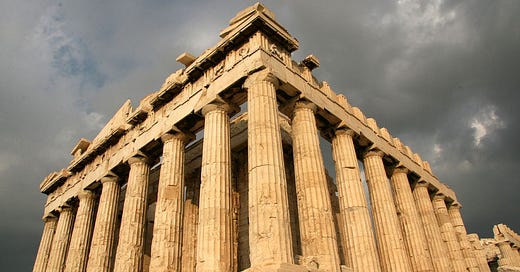Part II: Historical Roots
From "The Trouble With Elections: Everything We Thought We Knew About Democracy is Wrong," PART II: Chapter 6.1
In Part II of this book I will examine the roots from which democracy and our current system of electoral government arise. I will begin with a look backwards to the beginnings of democracy in Ancient Greece, and then the development of what is now called “representative democracy” in the 18th Century. Surprisingly, there is no direct evolutionary chain that leads from Ancient Greek democracy to what people call “democracy” today. Even the direct democracy, or “assembly democracy” of New England town meetings was the result of independent convergent evolution, and not inspired by Athens. Likewise, the democratic tool of sortition we use today in the selection of jurors, was not handed down from Athens, but was also invented anew.
We learn in school that Athens was the birthplace of democracy. The full story is, of course, much more complicated. Precursors in the form of proto-democratic assemblies existed in Mesopotamia and Phoenicia (from where Greeks also got the basis of their alphabet) centuries before. It also seems likely that democratic structures had been re-invented on a small scale countless times throughout pre-history. But, even within ancient Greece, Athens was not the only nor the first Greek democracy — merely the best documented, and most prosperous. Of the hundreds of Greek city states (poleis), on the Greek peninsula proper, and far-flung Greek communities around the Mediterranean, a substantial number were democracies, including Corinth and Syracuse. We also learn in school that it is the unique system of a sovereign popular assembly open to all adult male citizens that defines Greek democracy. However, this is incorrect. A court jury (dikasterion), whose members were chosen by lot, could overrule decisions of the Assembly. This is why the ancient biographer and historian Plutarch stated that the popular courts were the actual sovereign bodies of Athens, rather than the Assembly. A recent and far-reaching analysis by Dr. Daniela Cammack affirms this view, stating that
“Our ancient sources [especially the surviving speeches of Athenian orators and Aristotle’s Constitution of Athens] suggest that the most significant and distinctively democratic institution in Athens was the courts, where decisions were made by large panels of randomly selected ordinary citizens…”
The Assembly (ecclesia) was not the defining feature of Greek democracy. Many Greek kingdoms and aristocracies had regular assemblies of citizens as well. But citizens at an assembly in Sparta, for example, were restricted to voting on agenda items presented by the elite aristocrats. The distinctly democratic feature of Athens and other democracies was the fact that randomly-selected bodies of ordinary citizens were responsible for preparing the agenda, and for reviewing and administering the laws, and that any citizen, even a landless laborer, could propose legislation. The political use of the lottery was central to democracy. Classics scholar Josiah Ober has noted recently discovered evidence about the centrality of the randomly selected council from another Greek democratic city-state not far from Athens.
“In terms of making a participatory Greek democracy work, the key institution was a popular deliberative council [as distinct from an assembly] chosen from the entire citizen body. The Greek recognition of the centrality of a popular council for democracy is underlined by a recently discovered inscription from Eretria. In ca. 340 B.C. the Eretrian democracy promulgated a decree offering rewards to a potential tyrant killer, that is, to anyone who took direct and violent action against those who sought to overthrow the existing democratic government. In a revealing passage, the decree orders all citizens to fight without waiting to receive orders if anyone tries to establish ‘some constitution other than a Council and a prutaneia (a subset of the Council) appointed by lot from all Eretrians.’”
Another thing we learn in school is that the Athenian form of democracy is dependent on having a relatively small society, and thus has little to offer as a model for a modern nation state of millions. It is commonplace to make a fundamental distinction between direct democracy (with Classical Athens as the supposed archetype) and modern so-called “representative democracy.” I contend that all democracies with more than a few hundred members, including Classical Athens, are in reality representative. Athenian democracy was not based on the principle that all citizens could or should participate in a face-to-face manner in all decisions in the Assembly. That would have been impossible in Classical Athens just as it is in large nations today. Some subset of “the people” stand in for, or represent the people as a whole. Even in Athens, the outdoor amphitheater and meeting place of the Assembly, the pnyx, could only accommodate around 6,000, and after its expansion, maybe more than 8,000 citizens. Yet the eligible male citizens are generally estimated to have been between 30,000 and 60,000. So even setting aside the fact that women, foreigners and slaves were excluded (as they were in the electoral system of the United States of the eighteenth and nineteenth centuries), it was always a fraction of those who were eligible who made decisions in the Assembly. What’s more, many of the political decisions in Athens were made by much smaller, more or less representative bodies, such as the Council of Five Hundred (boule), which set the agenda and prepared resolutions for the Assembly, the Courts, and the Legislative Panels (nomothetai), which, after the reforms of 403 BCE, adopted all laws in the mature Athenian democracy (rather than the Assembly) – all selected by lot.






If I ever learned anything about ancient Athens in school, it wasn’t the intricacies of their political structure. I did do some classics in college, but I don’t remember learning about the details in this post. Seems to me that our education should be filled with civics and political science and debate and other similarly worthy subjects. Maybe it depends on where you are educated.